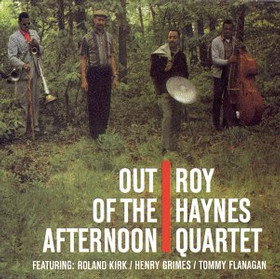|
Haynes has been drumming since the golden era and has managed to stay in hip step with jazz ever since. The Haynes sound is unmistakable; all it takes is a few seconds of his snare shots or hi-hat flurries to know who’s vibrating the kit. Like any good drummer, he not only propels the tune and generates interest by himself but also makes other people sound better. We Three Nov. 1958 / New Jazz The art of the piano trio hadn’t fully been realized yet in the 1950s, but some albums made further strides than others. At the very least, the players must be able to carry a three-way conversation, rather than just sounding like a rhythm section awaiting a horn or two. Roy Haynes certainly provides that personality on drums, and bassist Paul Chambers is an excellent supporter who can deliver a solid solo. I knew relatively little about pianist Phineas Newborn before hearing this album; he seems to have had a showboating reputation, but apart from a few gaudy ornaments, he controls his flash and delivers some excellent work on the better tunes here. The music fits snugly into post-bop style and retains a crisp feel today. “Reflection” opens the album with a drum flourish and an ultra-cool vamp, giving way to a standard progression that gets the players on their way. “Sugar Ray” is a more soulful number, full of Newborn’s bluesy piano and the rhythm team’s finesse. I’m not convinced by the ballad “Solitaire” or the slow blues “After Hours”, both of which run long and endure overbearing piano, but the final two tracks, “Sneakin’ Around” and “Our Delight”, are much tighter operations, and the latter gives Haynes a good spotlight.
Though not an earth-shattering record, We Three has a very agreeable vibe, and it speaks well of Haynes’ flair. Check out the sharp RVG remaster.
The skinny on this date is that Roland Kirk steals it, but you have to consider two things: a) Kirk always sounds like he’s stealing the show, wherever you hear him, and b) Roy’s got it locked up regardless. Haynes was the first drummer I can think of to be as flexible as he is, always marking forward time but cutting across the beat with sneaky accents. His natural flow sounds freer than the clearly delineated playing of a Max or Art, excellent as those two gentlemen are. Elvin Jones flows freely but often makes a forceful show of it; Haynes’ playing comes and goes effortlessly. This session of standards and originals is rendered by Roland Kirk on various saxes and flutes (a front line unto himself), Tommy Flanagan on piano, Henry Grimes on bass, and the leader at the kit. My impression is that Kirk pulls the music up, Roy stretches it sideways, and the team in the middle keeps it real, so to speak. The material could have made for a middling record, nothing more, but these personalities turn Afternoon into a pretty special album. The one-two opening punch of “Moonray” and “Fly Me to the Moon” is hard to beat as a display of Kirk’s musicality. Whatever conceptions one might have of his gimmickry and/or showmanship, the man can really dig in when he wants. When he blows two saxes simultaneously, it’s for musical purpose, not superficial effect, and notice how it serves these theme statements. Then come two Haynes originals. “Raoul” drives with Coltrane-like fervor (Kirk plays the soprano-like manzello) and contains some nice work from Flanagan. “Snap Crackle” enters and leaves on off-balance cadence and swings lightly in the middle, where Kirk takes to the flute. Roy gets a solo as well, and the title of the track refers to the sounds he makes all over the album.
“If I Should Lose You” has a red-hot statement from Kirk; “Long Wharf” stretches out; and “Some Other Spring” is a relaxed finale. Haynes does a lot of great drumming, and Kirk fans cannot miss his fine performance on this CD. Whenever I look at the cover photo, I give it mental captions: “Honey, the Roy Haynes Quartet is here again!” “Well, let ‘em set up!”
Joining Haynes are pianist Danilo Perez and bassist John Patitucci, a couple of relatively youthful overachievers who keep getting better over the years. The disc is split into six studio and four live cuts, all of which refer to entries on Haynes’ resume. Bud Powell’s “Wail”, for example, dates from the bebop days, while Pat Metheny’s “Question and Answer” travels a significant amount of time and space forward. That Haynes played on the original recordings of both is testament to his lifelong adaptability (how many times did his phone ring in the 20th century?), and hearing him re-polish these and several other tunes makes for a celebratory listening hour. Perez is outstanding - occasionally showy, but not too much - and Patitucci provides articulate counterpoint, leaving Haynes to blur the bar lines.
Of the studio tracks, Chick Corea’s “Folk Song” is a standout that bobs and weaves through the arousing chord changes, and the previously mentioned numbers are quite nice as well. The live set touches early Miles (“Sippin’ at Bells”, with tasty drum breaks) and classic Duke (“Prelude to a Kiss”), though it gets its best kicks from a couple of Monk tributes, one of which is “Bright Mississippi”. The other, “Green Chimneys”, is alone reason to seek the album out. It begins with a drum etude from Haynes that leads into the syncopated theme. Patitucci takes a bass solo full of interjections from piano and drums (great, great interplay) that seamlessly transition to Perez’s solo. The group finally hits the Swing button with overwhelming relief as Perez takes off. Amazing to hear players listening to each other like this. Wonderful album.
|
